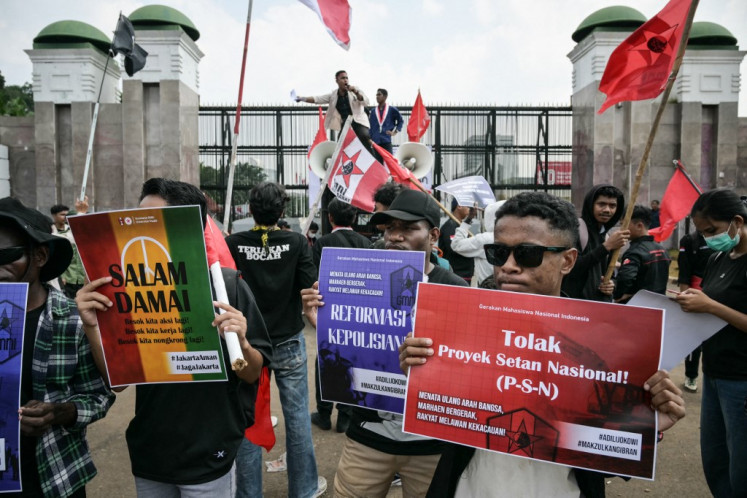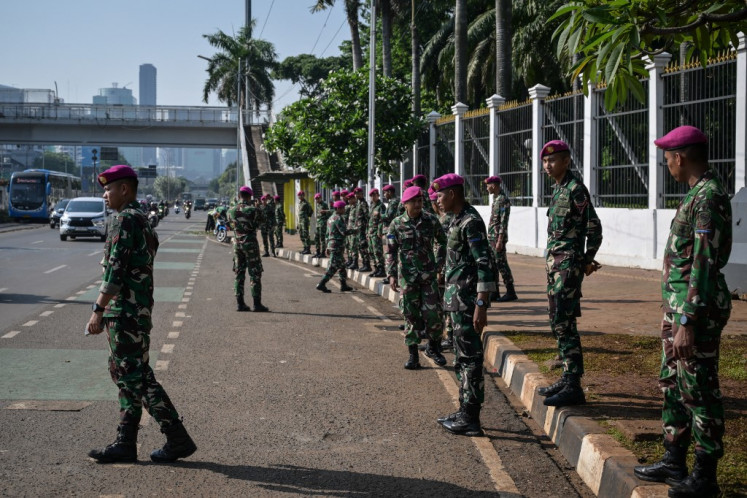Popular Reads
Top Results
Can't find what you're looking for?
View all search resultsPopular Reads
Top Results
Can't find what you're looking for?
View all search resultsG20 Ministers Envision Joint Commitment on Energy Transition Acceleration at Bali Summit
Change text size
Gift Premium Articles
to Anyone

Energy ministers from the Group of 20 countries have expressed their expectation that the energy transition acceleration agenda will become a joint commitment included in one of the declaration points at the G20 Summit in Bali from Nov. 15 to 16.
According to the ministers, accelerating the energy transition will serve as part of the key solution to address the current ongoing global energy crisis.
The ministers’ sentiments were highlighted by the Energy and Mineral Resources Ministry’s Strategic Planning Division Senior Advisor Yudo Dwinanda Priaadi at an online #G20Update press conference on Tuesday.
"The G20 countries have agreed to accelerate energy transition, including to ensure the achievement of the sustainable global development targets by 2030, particularly on the access to reliable, sustainable and affordable modern energy for all,” he said.
Yudo explained that G20 Energy Ministers had agreed on the “Bali Compact,” which is the result of the Energy Transitions Ministerial Meeting (ETMM) held in Bali earlier in September. Containing nine principles, the Bali Compact serves as a significant part in the energy transition acceleration.
Those nine principles include strengthening trust and transparency in planning, execution and evaluation at the national level; increasing energy resilience, market stability and affordability; and securing energy supply, infrastructure and resilient, sustainable and reliable systems.
The other principles are increasing energy efficiency implementation; diversifying energy systems and mix; and decreasing emission of all energy sources.
Next are catalyzing inclusive and sustainable investments from a large scale into a lower-emission energy system or net-zero emissions; and collaborating in mobilizing all funding sources to reach the objectives of the 2030 Agenda for Sustainable Development Goals (SDG) and the Paris Agreement.
The principles also comprise improving innovative, affordable, smart, low emission or net-zero emissions technology and building and reinforcing innovative ecosystems to encourage related research, development, demonstration, dissemination and implementation.
Yudo noted that during the Bali meeting, all energy ministers had agreed to conduct the energy transition process without leaving anyone behind and reach global targets despite differences in their respective countries’ situations and conditions.
The countries underlined the importance of the development of innovative and affordable technology to support the energy transition, including the significance of collaboration in the transfer of knowledge and technology innovation.
The countries also agreed to stimulate more investments and encourage fund transfer to developing countries regarding energy transition acceleration.
According to Yudo, there are challenges to deal with in manifesting the energy transition, including technology. “The budget is also a challenge,” he said, adding that energy transition would require large funding, including for accelerating the decommissioning of steam power plants (PLTUs).
Technology mastery, project execution terms and supporting industry preparedness in terms of technical or economical aspects add to the list of challenges to tackle.
Yudo said that to overcome these challenges, Indonesia has made several breakthroughs, such as issuing Presidential Regulation No. 112/2022 concerning the acceleration of renewable energy development for electricity supplies.
One of the most vital breakthroughs is the drafting of a bill on new and renewable energy (EBET), which aims to provide a legal basis, strengthen the institution and management, create a conducive investment environment and utilize renewable energy for the development of the national economy.
“The bill will become a game changer in accelerating Indonesia’s energy transition,” Yudo concluded.










